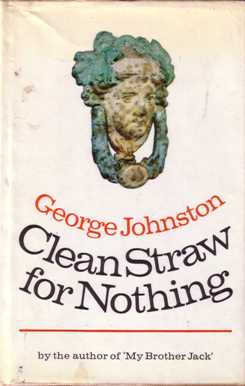Story outline
In real life, Johnston abandoned a conventional career in Australia in journalism, and moved to a Greek island which was a magnet at the time for artists and writers. The novel similarly tells the story of a journalist (David Meredith) who relocates to a Greek island, but fails to find the answers he seeks.
Meredith's relationship with his second wife, Cressida, closely parallels Johnston's second marriage to Charmian Clift. On the eve of Clean Straw for Nothing's publication, Clift overdosed on barbiturates in Sydney. In a posthumously-published essay, My Husband George, Clift wrote: "I do believe that novelists must be free to write what they like, in any way they liked to write it (and after all who but myself had urged and nagged him into it?), but the stuff of which Clean Straw for Nothing is made is largely experience in which I, too, have shared and ... have felt differently because I am a different person..." [4]
This page is based on this
Wikipedia article Text is available under the
CC BY-SA 4.0 license; additional terms may apply.
Images, videos and audio are available under their respective licenses.
